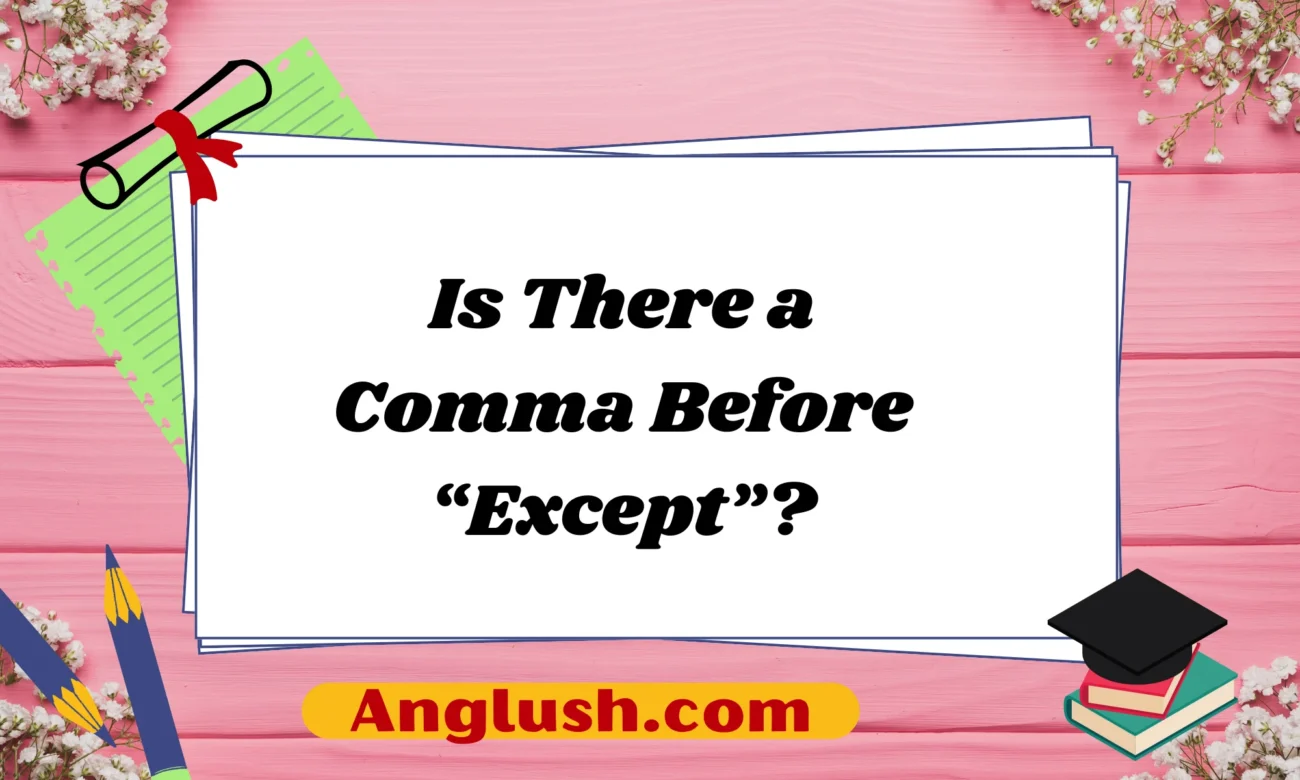Introduction
The word “except” is commonly used in both spoken and written English to indicate an exclusion. However, one of the most frequent grammar questions writers encounter is whether a comma should come before “except” in a sentence. Understanding the correct placement of commas is crucial for clarity, readability, and grammatical accuracy.
This article will explore when to use a comma before “except,” the grammatical rules governing its usage, and examples of different sentence structures. Additionally, we will provide ten texting examples that showcase user-friendly applications of “except” in digital communication.
Understanding the Role of “Except” in a Sentence
The word “except” can function as different parts of speech depending on how it is used in a sentence:
- Preposition – It excludes something from a general statement.
- All the students attended the meeting except John.
- Conjunction – It introduces an exception or contrast.
- I would come with you, except I have a prior commitment.
- Verb (less common usage) – It means “to exclude.”
- The policy excepts those who have already paid.
Because “except” serves different grammatical roles, whether or not to use a comma before it depends on sentence structure and clarity.
When to Use a Comma Before “Except”
A comma before “except” is required in certain situations. Here are some rules to help you decide when it is necessary:
1. When “Except” Introduces a Non-Essential Clause
If “except” introduces additional information that is not essential to the sentence’s meaning, a comma should precede it.
✅ Correct:
- Everyone, except for Tom, arrived early.
- The store carries all kinds of fruits, except bananas.
Here, the commas indicate that the phrase following “except” is extra information rather than an essential part of the sentence.
2. When “Except” Appears After an Independent Clause
When “except” follows a complete thought (independent clause), a comma is often necessary.
✅ Correct:
- I would love to join you, except I already have plans.
- The book was interesting, except the ending was too predictable.
These examples contain two independent clauses separated by “except.” The comma helps clarify the separation of ideas.
3. When “Except” is Part of a Parenthetical Expression
Sometimes, “except” is used in a way that requires additional commas to separate non-essential elements.
✅ Correct:
- The hotel, except for the outdated decor, was fantastic.
- Everyone, except for James, agreed with the plan.
In these cases, the phrase after “except” provides extra detail that is not necessary for the sentence’s overall meaning.
When NOT to Use a Comma Before “Except”
There are instances where using a comma before “except” would be incorrect.
1. When “Except” Directly Follows the Subject Without an Interruption
If the word “except” is essential to the sentence’s meaning, a comma should not be used.
❌ Incorrect:
- Everyone, except Sarah, was late.
✅ Correct:
- Everyone except Sarah was late.
Since “except Sarah” is crucial to the sentence, no commas are needed.
2. When “Except” is Used as a Preposition in a Simple Sentence
When “except” functions as a preposition and does not introduce extra information, no comma is necessary.
✅ Correct:
- We work every day except Sunday.
- I like all vegetables except broccoli.
These sentences would be incorrect with a comma because the phrase following “except” is essential to their meaning.
3. When “Except” Connects a Dependent Clause to an Independent Clause
If “except” introduces a dependent clause, no comma is needed.
✅ Correct:
- I won’t go except if you come with me.
- She never eats dessert except when it’s chocolate.
Adding a comma before “except” in these cases would unnecessarily break the flow of the sentence.
10 Texting Examples Featuring “Except”
Here are ten user-friendly texting examples demonstrating the correct usage of “except” in casual digital communication:
- I’m free all day except from 3 to 5 PM.
- Everyone is coming except Jake.
- I liked the movie, except the ending was too long.
- She didn’t say much, except that she’d be late.
- All my friends love sushi except me!
- The restaurant was great, except the service was slow.
- I can make it any day next week except Monday.
- Nothing changed except for the new paint color.
- The trip was perfect, except we got a little lost.
- I don’t mind doing anything except washing the dishes!
Key Takeaways
- A comma before “except” is needed when it introduces non-essential information, follows an independent clause, or is part of a parenthetical phrase.
- A comma is NOT needed when “except” is essential to the sentence, follows the subject directly, or connects a dependent clause.
- The best way to determine whether to use a comma before “except” is to read the sentence aloud and see if a natural pause is needed for clarity.
Conclusion
Using a comma before “except” depends on the grammatical structure and meaning of the sentence. While there are clear rules, the key is to ensure clarity and readability. Whether writing formally, casually, or in a text message, applying these rules will help improve your writing and avoid common punctuation errors.

